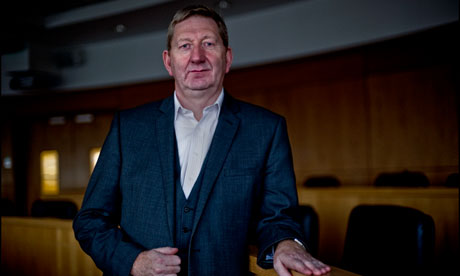We know how much Unite gives Labour, but finding out who writes the cheques for Conservative Central Office is more difficult

Len McCluskey, general secretary of Unite. Photograph: Sarah Lee for the Guardian
I've just been reading about a political party in hock to shadowy donors who enjoy easy access to its leadership and untold influence over its policies. It's scandalous stuff. That's right: I've just been reading about David Cameron's Conservative party.
Few activities are more congenial to the British commentariat than an afternoon's fox-hunting that can be moralised away as "grownup" debate. So it is with Ed Miliband and Len McCluskey. Even as they fire upon Ed for not being his brother, the pundits insist their real subject is party funding and who runs British politics. Yet mentions of the Tories' paymasters are inevitably brief and come with the gloss of "they're all as bad as each other".
Actually, they're not. Yes, some of the allegations about Falkirk are shaming. And it goes without saying that all three main parties are damagingly dependent on big donors; no Obama-style flood of 20s and 50s on this side of the water. But when it comes to concentration of funding, the opacity over where the cash comes from and the overlap between policy and donor interests, the Conservatives look far more corrupted.
We know how much Unite gives Labour because it's out in the open: all fully checkable on the Electoral Commission's website. Finding out who writes the cheques for Conservative Central Office is far harder. Cameron's funders seem to prefer channeling their money through conduits, or splitting the cash between multiple donors.
Through their forensic investigation into Tory funding, published just after the last general election, Stephen Crone and Stuart Wilks-Heeg discovered that some of the largest contributors would give a few hundred thousand: big, but not big enough to raise eyebrows. But then a funny thing could be spotted in the accounts: their wives and other family members would chip in, as well as their business ventures.
Take the JCB billionaire Sir Anthony Bamford, one of Cameron's favourite businessmen and a regular guest on the PM's trade missions abroad. Between 2001 and summer 2010, Wilks-Heeg and Crone found donations from Anthony Bamford, Mark Bamford, George Bamford, JCB Bamford Excavators, JCB Research, and JCB World Brands. Tot that up and you get a contribution to the Conservative party from the Bamford family of £3,898,900. But you'd need to be an expert sleuth with plenty of time and resources to tot it up.
One family: nearly £4m. Wilks-Heeg and Crone found that 15 of these families or "donor groups" account for almost a third of all Tory funding. They enjoy trips to Chequers, dinners in Downing Street and a friendly prime ministerial ear. Lord Irvine Laidlaw stuffed over £6m into Conservative pockets over a decade and, one of his former staffers told the Mail, liked to boast about his influence over party leaders: "William's [Hague] in my pocket".
Perhaps you're wondering why the Tories talked so tough on banking reform before election but have done so little since. That may have something to do with the money the City gives to them. According to the Bureau of Investigative Journalism, in 2010 donations from financial services accounted for over half of all Tory funding.
Three years ago, spread-betting boss Stuart Wheeler brazenly told MPs that "a party is going to take more notice of somebody who might give them lots of money than somebody who won't". He should know; he once gave the Conservatives a single donation of £5m. And certainly, the City has plenty to show for its investment. Across Europe, Angela Merkel, François Hollande and others are pushing ahead with plans for a Tobin tax or a small levy on financial transactions to start next year. Britain, on the other hand, is part of a small band of refuseniks, along with such other giants of financial regulation as Malta and Luxembourg.
One of the mysteries of this government is why George Osborne made a priority of cutting the 50p tax for the super-rich, thus handing the opposition a stick to beat him with. One possible answer to that is suggested by an FT report from November 2011 on hedge-fund donations to Osborne's party. "There probably aren't many votes in cutting the 50p top rate of tax," one major hedge fund donor told the paper, "but among those that give significant amounts to the party, it's a big issue, and that's probably why it's a big issue for the party too". Just four months later, at the next budget, the 50p rate was scrapped.
What, by contrast, has Uncle Len ever got from Ed Miliband? A promise of an end to the pay freeze for public servants? Nyet. A commitment to break from austerity? Nein. In spring 2010, the Telegraph claimed that Labour ministers "echoed the union's opposition to Kraft's takeover of Cadbury". This would be the takeover that actually went through. There are shades here of the MPs' expenses scandal, when the Tory schemes for lifting money from taxpayers were so baroque that they attracted less opprobrium than Labour parliamentarians claiming for bath plugs and blue movies. So it is with McCluskey's plan to fill Falkirk's constituency Labour party with Unite's Keystone Cops, even while hedgie Michael Hintze puts nearly £40,000 towards the chancellor's expenses alone and reaps the reward of a cut in his taxes.
But there's something else going on, too. Westminster and the press are still ruled by the idea that if workers' representatives seek to influence politics they must be bullies; while if capitalists get their way, then that's inevitably good for capitalism. Five years on from the banking crisis and all the evidence to the contrary, that really is a link that needs ending.

No comments:
Post a Comment